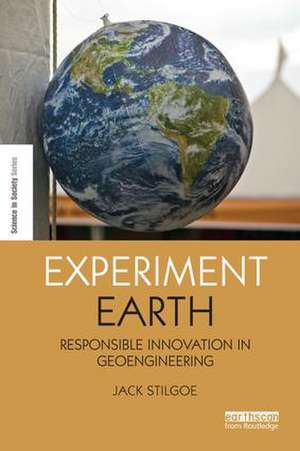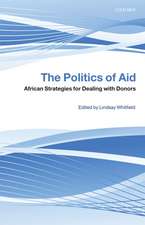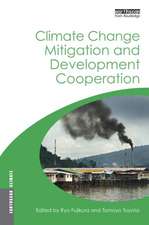Experiment Earth: Responsible innovation in geoengineering: The Earthscan Science in Society Series
Autor Jack Stilgoeen Limba Engleză Paperback – 10 mai 2016
This book gives students, researchers and the general reader interested in the place of science in contemporary society a compelling framework for future thinking and discussion.
| Toate formatele și edițiile | Preț | Express |
|---|---|---|
| Paperback (1) | 412.37 lei 6-8 săpt. | |
| Taylor & Francis – 10 mai 2016 | 412.37 lei 6-8 săpt. | |
| Hardback (1) | 1055.51 lei 6-8 săpt. | |
| Taylor & Francis – 24 feb 2015 | 1055.51 lei 6-8 săpt. |
Din seria The Earthscan Science in Society Series
-
 Preț: 340.37 lei
Preț: 340.37 lei -
 Preț: 340.37 lei
Preț: 340.37 lei -
 Preț: 198.19 lei
Preț: 198.19 lei -
 Preț: 488.29 lei
Preț: 488.29 lei -
 Preț: 382.75 lei
Preț: 382.75 lei -
 Preț: 456.06 lei
Preț: 456.06 lei -
 Preț: 424.58 lei
Preț: 424.58 lei -
 Preț: 418.67 lei
Preț: 418.67 lei - 18%
 Preț: 1017.91 lei
Preț: 1017.91 lei -
 Preț: 469.34 lei
Preț: 469.34 lei - 21%
 Preț: 378.39 lei
Preț: 378.39 lei -
 Preț: 449.41 lei
Preț: 449.41 lei -
 Preț: 469.34 lei
Preț: 469.34 lei - 12%
 Preț: 299.52 lei
Preț: 299.52 lei - 13%
 Preț: 333.12 lei
Preț: 333.12 lei -
 Preț: 416.22 lei
Preț: 416.22 lei -
 Preț: 413.33 lei
Preț: 413.33 lei -
 Preț: 116.59 lei
Preț: 116.59 lei -
 Preț: 411.42 lei
Preț: 411.42 lei - 22%
 Preț: 332.02 lei
Preț: 332.02 lei - 15%
 Preț: 463.46 lei
Preț: 463.46 lei -
 Preț: 444.62 lei
Preț: 444.62 lei - 18%
 Preț: 1001.87 lei
Preț: 1001.87 lei - 18%
 Preț: 1114.64 lei
Preț: 1114.64 lei -
 Preț: 392.24 lei
Preț: 392.24 lei -
 Preț: 390.54 lei
Preț: 390.54 lei -
 Preț: 357.43 lei
Preț: 357.43 lei - 18%
 Preț: 1054.71 lei
Preț: 1054.71 lei -
 Preț: 444.62 lei
Preț: 444.62 lei - 18%
 Preț: 1278.88 lei
Preț: 1278.88 lei - 26%
 Preț: 764.20 lei
Preț: 764.20 lei
Preț: 412.37 lei
Nou
Puncte Express: 619
Preț estimativ în valută:
78.90€ • 82.38$ • 65.31£
78.90€ • 82.38$ • 65.31£
Carte tipărită la comandă
Livrare economică 04-18 aprilie
Preluare comenzi: 021 569.72.76
Specificații
ISBN-13: 9781138691940
ISBN-10: 1138691941
Pagini: 222
Dimensiuni: 156 x 234 x 21 mm
Greutate: 0.36 kg
Ediția:1
Editura: Taylor & Francis
Colecția Routledge
Seria The Earthscan Science in Society Series
Locul publicării:Oxford, United Kingdom
ISBN-10: 1138691941
Pagini: 222
Dimensiuni: 156 x 234 x 21 mm
Greutate: 0.36 kg
Ediția:1
Editura: Taylor & Francis
Colecția Routledge
Seria The Earthscan Science in Society Series
Locul publicării:Oxford, United Kingdom
Public țintă
PostgraduateCuprins
1. Balloon Debate 2. Taking Care of the Future 3. Rethinking the Unthinkable 4. Behind the Scenes at the Royal Society 5. Open-Air Experimentation 6. Making Models 7. The Reluctant Geoengineers 7. Reclaiming the Experiment
Recenzii
"How should society react when the technological imagination seizes on the Earth itself as an experimental system? In this graceful critique of magical thinking, Stilgoe dissects the moves by which some came to see geoengineering as a project that not only can be done but must be done. An essential addition to the renewed debate on climate change, the book invites citizens and policy makers to think again about expert claims of inevitability, and to retake the future as a space for ethical and democratic imagining."–Sheila Jasanoff, Harvard Kennedy School, USA
"Experiment Earth is a book that is urgently needed. As human development becomes ever-more interwoven with the evolution of climate, Stilgoe asks a profound question: ‘What does it mean to take responsibility for global climate?’ His answer is more than about climate and science, and more than about geoengineering technologies. It is about how we see ourselves as responsible human beings, exercising power, creativity and judgement in the world, whilst remaining accountable to each other."–Mike Hulme, King’s College London, UK
"To geoengineer or not to geoengineer the climate will be one of the defining science and environment policy questions of the next fifty years. In 'Experiment Earth', Jack Stilgoe provides an indispensable guide to the theories, politics and personalities which have shaped this emerging debate. With his unique perspective on the controversial SPICE project and the internal machinations of the Royal Society, Stilgoe digs beneath more superficial media coverage, to understand geoengineering as an experimental site for new approaches to the governance of technology and innovation. Entertaining, informative and insightful, this book should be read by all those who care about the future of science, democracy and the environment."–James Wilsdon, University of Sussex, UK
"Climate Engineering is a challenging subject to approach. One must be walk the line between normalisation of what, to many, appears unthinkable and a manifesto for despair and inaction opposite the very real threat of climate change. This book struggles admirably with this tension: what it is like to work on an idea you hope never happens, and how could you ever control it? Stilgoe has been afforded access to the scientists working in this difficult arena, building trust and detailing our, and his, struggle to come to terms with the enormity of the problem. If you want to be inspired to wrestle with the intellectual challenges of how one might govern climate engineering technologies there may never be a better and more timely read than this." –Matt Watson, University of Bristol, UK
"This book offers much food for thought and discussion.Summing Up: Highly recommended. All readership levels." - CHOICE, C. W. Dimmick, emeritus, Central Connecticut State University
"Fascinating and informative... Stilgoe provides an important and valuable step forward in thinking about managing geoengineering and how scientists might see their role in the process." - Robert J. Lempert, RAND, USA
"Experiment Earth is a book that is urgently needed. As human development becomes ever-more interwoven with the evolution of climate, Stilgoe asks a profound question: ‘What does it mean to take responsibility for global climate?’ His answer is more than about climate and science, and more than about geoengineering technologies. It is about how we see ourselves as responsible human beings, exercising power, creativity and judgement in the world, whilst remaining accountable to each other."–Mike Hulme, King’s College London, UK
"To geoengineer or not to geoengineer the climate will be one of the defining science and environment policy questions of the next fifty years. In 'Experiment Earth', Jack Stilgoe provides an indispensable guide to the theories, politics and personalities which have shaped this emerging debate. With his unique perspective on the controversial SPICE project and the internal machinations of the Royal Society, Stilgoe digs beneath more superficial media coverage, to understand geoengineering as an experimental site for new approaches to the governance of technology and innovation. Entertaining, informative and insightful, this book should be read by all those who care about the future of science, democracy and the environment."–James Wilsdon, University of Sussex, UK
"Climate Engineering is a challenging subject to approach. One must be walk the line between normalisation of what, to many, appears unthinkable and a manifesto for despair and inaction opposite the very real threat of climate change. This book struggles admirably with this tension: what it is like to work on an idea you hope never happens, and how could you ever control it? Stilgoe has been afforded access to the scientists working in this difficult arena, building trust and detailing our, and his, struggle to come to terms with the enormity of the problem. If you want to be inspired to wrestle with the intellectual challenges of how one might govern climate engineering technologies there may never be a better and more timely read than this." –Matt Watson, University of Bristol, UK
"This book offers much food for thought and discussion.Summing Up: Highly recommended. All readership levels." - CHOICE, C. W. Dimmick, emeritus, Central Connecticut State University
"Fascinating and informative... Stilgoe provides an important and valuable step forward in thinking about managing geoengineering and how scientists might see their role in the process." - Robert J. Lempert, RAND, USA
Descriere
This introduction to responsible innovation, as a new approach to governance, explains the broad sweep of technoscience that is brought under the umbrella of "geoengineering". The possibility of exerting control over the global climate introduces profound social, political and ethical questions. The book explores these issues through the lens of the research project SPICE (Stratospheric Particle Injection for Climate Engineering) one of the first major geoengineering studies worldwide. The book introduces recent ‘experiments’ in governance, involving new conversations with civil society and others, to explain science-in-society and suggest new ways forward. It illustrates broader dynamics that are of substantial relevance to both wider geoengineering debates and wider science and technology governance debates.









